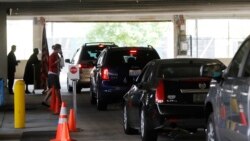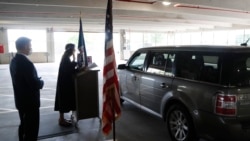The coronavirus health crisis has led to delays for thousands of people wanting to become citizens of the United States.
The federal agency that processes citizenship requests, U.S. Citizenship and Immigration Services, USCIS, suspended its in-person services in March. At that time, the agency said there were about 110,000 people waiting to complete the final steps to citizenship.
The process of becoming a U.S. citizen is known as “naturalization.” The final step in this process is to take an oath of loyalty to the country at an official ceremony.
Some individuals have been able to complete the process by taking part in an unusual drive-up ceremony.
The drive-up events are designed with physical distancing in mind to protect people from the coronavirus. Those taking part are required to wear face coverings. People remain in their vehicles while taking the citizenship oath. A government official stands a safe distance away to complete the swearing-in process.
One such ceremony took place recently in a parking garage near a federal office building in Detroit, Michigan. When 60-year-old Anita Rosenberger entered the garage, she was a British citizen. Thirty minutes later, after taking the oath, she drove away as a U.S. citizen.
“It was a nice experience in spite of the fact that I was in the car by myself with a mask on,” Rosenberger said. “And I will say that I will remember this.”
Similar drive-up ceremonies are being held across the country, but possibly not for much longer. USCIS says a budget crisis could force the agency to temporarily release nearly three-fourths of its workforce. If this happens, it could further delay the final citizenship steps for tens of thousands of people.
The citizenship agency has not explained how it will operate if it does not get $1.2 billion from Congress before August 3. It told The Associated Press that “all USCIS operations will be impacted” by the release of more than 13,000 workers.
USCIS receives nearly all its $4.8 billion budget from fees it collects from people who seek to live or work in the country. The agency is already getting less money after President Donald Trump’s administration ordered restrictions on immigration. The agency said effects of COVID-19 had reduced the amount by half.
The administration also stopped some programs - including a recent halt on H-1B visas for skilled workers - that provide an important source of money for USCIS.
Some in Congress have pushed to permit virtual swearing-in ceremonies, but the agency has so far refused.
Citizenship groups have warned that the citizenship delays could limit the rights of thousands of voters in the country’s elections later this year.
Time limits for election registration are nearing in some states. Individuals seeking to vote must be citizens when they register or risk facing criminal charges or possible deportation, the groups say.
I’m Bryan Lynn.
The Associated Press reported on this story. Bryan Lynn adapted the report for VOA Learning English. George Grow was the editor.
We want to hear from you. Write to us in the Comments section, and visit our Facebook page.
________________________________________________________________
Words in This Story
oath – n. a formal promise
parking – adj. leaving a vehicle in a particular place for a period of time
garage – n. a small building used to keep cars in
in spite of – phr. although something exists or happens
mask – n. a covering for the face
impact – n. the effect an event or situation has on someone or something
fee – n. an amount of money people pay to do or get something
source – n. where something comes from
virtual – adj. using computer and internet technology to conduct activities normally carried out in person
deportation – n. the forced removal of a person from a country







